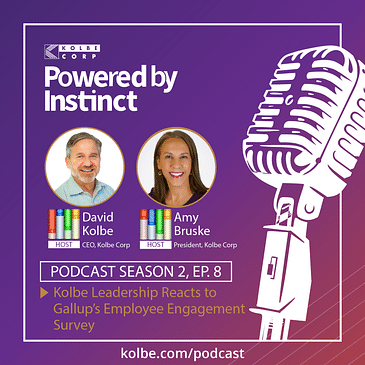Gallup’s employee engagement survey is out, and the numbers are down again. Less than 1/3 of American workers are actively engaged, and 18% are actively DISENGAGED.
More and more individuals are either quietly quitting their job or worse. Fortunately, there’s a missing link to engagement that can help both companies and employees find a better path forward.
In this episode of Powered by Instinct, David Kolbe and Amy Bruske, react to the Gallup poll and offer their insights. They discuss:
- The downward trend of employee disengagement
- Why leaders are in pain, too
- The biggest reasons for concerns
- The role remote work plays in engagement
- How Kolbe helps companies and employees connect
- The two questions every manager needs to ask their team
- Minor changes you can implement to make a massive difference
Hosts: Amy Bruske (3583) and David Kolbe (8273)
Key Insights
⚡Leaders are disengaged, too. So, taking care of them is vital. Amy says, "I think we need to talk about the employees, but I also want to touch base a little bit on leaders because they are burnt out. And the Gallup survey that came out some time in late 2022 — I think it was right around October or November — was showing that only one in three leaders are engaged."
⚡Companies need to embrace employee strengths. No amount of perks and parties will replace the need for workers to use their instinctive strengths in their daily role. Amy says, "People who absolutely love their jobs — and yes, I'm going to use the word love — love their job like it's a fit. In order for it to be a fit, it has to fit you in all three parts of the mind, which we can talk about in a minute. But those are the people that tend to be more engaged, and they want to stick around."
⚡Kolbe helps you ask the right questions. One suggested solution to disengagement is to make sure managers talk more 1-on-1 with employees. But it’s vital you know what to ask. "One of the things that's just so simple and straightforward is asking someone, ‘How have you gotten to use your strengths this week?' or ‘What is the one task that you either keep putting off or is causing you the most stress?’ There are some really basic questions. If you haven't had those conversations with people this week, try those out — because it makes a big difference."
⚡Remote workers have a hard time connecting with the company. Remote work has become more common after the pandemic, but is it good for employee engagement? Amy says, "Worker concerns were the clarity of expectations, connection to the mission or the purpose of the company, and then opportunities to learn and grow. I do worry about younger people, younger in their careers. So early in your career, in any environment, how do you have opportunities to learn and grow where you're not getting to just observe some of it through osmosis, that you get some of the learning about how people get things done and solve problems? You're missing that too."
⚡Small things can make a big difference. Motivating your disengaged employees doesn't have to be a huge project. Instead, start small and focus on the little things. Amy says, "For any leaders that are listening right now, it's key to let you know that it's not about massive changes. So we're not talking about having to change everything about someone's role. Just doing one task that causes stress just a little bit differently or reducing the amount of time you work against your grain even by 10 or 20 percent, that makes a big difference in satisfaction."
If you would like to be a guest on Powered by Instinct or get in touch with any of our Kolbe Experts, send us a quick email: info@kolbe.com




